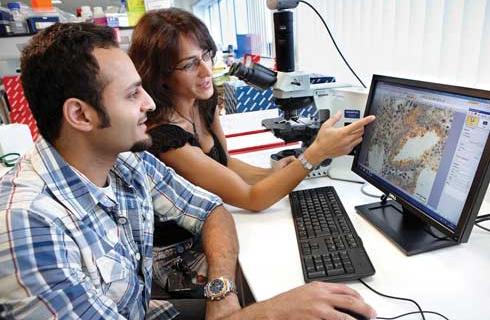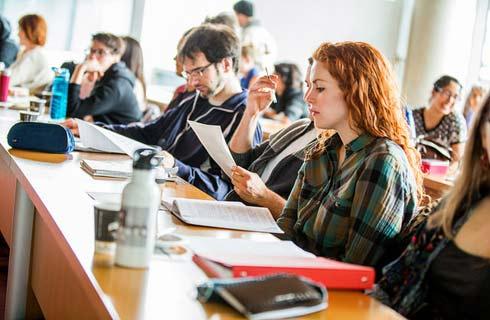工学学士(荣誉学位)-电气工程
Bachelor of Engineering (Honours) - Electrical Engineering

学历文凭
Bachelor Degree with Honours

专业院系
Engineering, Architecture and Information Technology

开学时间

课程时长

课程学费

国际学生入学条件
Queensland Year 12 (or equivalent) General English subject (Units 3 & 4, C); Mathematical Methods (Units 3 & 4, C); and one of Chemistry or Physics (Units 3 & 4, C).
Studying Specialist Mathematics (Units 3 & 4, C) and both Chemistry and Physics is recommended as students will have increased flexibility in their studies.
English language requirements
IELTS overall 6.5; reading 6; writing 6; speaking 6; listening 6. For other English Language Proficiency Tests and Scores approved for UQ
TOEFL iBT (including Paper Edition) - Overall 87, listening 19, reading 19, writing 21 and speaking 19.
PTE Academic - Overall Score of 64 and 60 in all sub bands.
BE - A minimum overall grade of 4 plus a minimum grade of C in all macro skills.
CES - Overall 176 and 169 in all sub bands.
OET is not accepted.
IDP—雅思考试联合主办方

雅思考试总分
- 雅思总分:
- 托福网考总分:
- 托福笔试总分:
- 其他语言考试:
CRICOS代码: 080734K
申请截止日期: 请与IDP联系 以获取详细信息。
课程简介
The University of Queensland's engineering program offers the largest choice of engineering programs in Queensland, with a large number of distinct specialisations, majors, and minors. The flexible curriculum equips students to work in both established and newly emerging areas of engineering. Students develop their understanding by applying science and engineering principles to engineering problems of commercial importance. In addition to technical expertise, the program emphasises essential workplace skills such as communication, teamwork, project management, problem-solving and lifelong learning. The UQ engineering degree is widely accredited and respected and this degree equips students to work both in Australia and overseas. We’ve been busy reimagining the Bachelor of Engineering (Honours) and have crafted a new curriculum that will place you at the forefront of engineering in 2024, 2034 and beyond. You’ll benefit from a new flexible first year with hands-on experiences across all aspects of engineering, more study options for greater career opportunities, and direct contact with industry – your future employers – threaded throughout your degree. You’ll develop technical skills through a core specialisation, which will form the basis of your career. Choose from either chemical engineering, civil engineering, electrical engineering, mechanical engineering, mechatronic engineering or software engineering. You’ll also have the option to complement your engineering specialisation with a major or minor in one of the new and emerging areas of engineering. Our broad range of majors allows you to further tailor your studies to match your career aspirations and deep dive into your interests. Electrical engineering is concerned with electrical and electronic devices and systems. Electrical engineers work with equipment ranging from heavy power generators to tiny computer chips. Their work contributes to almost every sector of society: for example, home theatre entertainment systems, mobile phones, digital cameras and television to enhance our lifestyle, medical imaging systems for improved health care, electrical appliances for homes, scientific instruments for laboratories, lasers for reliable high speed communication, handheld multimedia devices to provide information on the move, and satellite systems for remote sensing of the environment and reliable mobile and fixed energy systems to power all of these. Tailor your specialisation in electrical engineering with majors or minors that meet your interests and career goals. Electrical engineering offers these options: Majors Biomedical engineering Computer engineering Minors Computing Data science Design.
相关申请
 预科
预科 奖学金
奖学金 实习机会
实习机会 在校学习
在校学习 跨境学习
跨境学习 校园授课-线上开始
校园授课-线上开始 在线/远程学习
在线/远程学习
开学时间&学费
学费信息仅供参考,请与IDP联系以获取详细信息
| 开学时间 | 时长 | 学费 | 地点 |
|---|
关于昆士兰大学

昆士兰大学(简称UQ)位于澳大利亚布里斯班,一直位于世界一流大学之列,在教学、学习和研究方面都有着无与伦比的卓越成就。昆士兰大学在全球享有盛誉,通过提供知识领导力来创造积极的变化,从而建设更美好的世界。昆士兰大学经常跻身世界一流大学行列,其中包括: 根据 2024 年世界大学科学论文绩效排名(NTU 排名),排名第 40 位。 2024 年《美国新闻》全球最佳大学排名第 41 位 2025 年 QS 世界大学排名第 40 位 2024 年世界大学学术排名第 63 位 2024 年泰晤士高等教育世界大学排名第 70 位昆士兰大学十分注重教学质量,获得的国家级教学奖项比澳大利亚任何其他大学都多。超过55000 名在校学生,包括 21500 名国际学生,在三个美丽的校区为一个多元化、包容性的社区做出了贡献。昆士兰大学以其轻松安全的生活方式、亚热带气候和充满活力的多元文化而闻名于世,学生在这里可以享受到世界上最好的校园生活。在课堂之外,大学还提供一系列令人兴奋的活动,满足学生的课外兴趣。昆士兰大学屡获殊荣的职业与就业服务为学生毕业后获得竞争优势提供支持。学生可利用每年举办的就业研讨会和社交活动,与大学广泛的校友和专业合作伙伴建立联系。昆士兰大学培养的毕业生在全球享有盛誉,他们随时准备开创成功的事业,成为各自领域的佼佼者。昆士兰大学 35.0 万名毕业生组成了一个全球校友网络,遍布 190 个国家,拥有 17700 多名博士。
本校相关课程

流行病学硕士
学历文凭
Masters Degree (Coursework)
开学日期
课程费用总额


教育学硕士-行为管理
学历文凭
Masters Degree (Coursework)
开学日期
课程费用总额


计算机科学研究生证书
学历文凭
Graduate Certificate
开学日期
课程费用总额


计算机科学硕士
学历文凭
Masters Degree (Coursework)
开学日期
课程费用总额


计算机科学研究生文凭
学历文凭
Graduate Diploma
开学日期
课程费用总额


工商管理研究生文凭
学历文凭
Graduate Diploma
开学日期
课程费用总额

其他相关课程

微电子与计算机工程理学硕士
 赫特福德大学
赫特福德大学泰晤士高等教育世界大学排名:765
学历文凭
Masters Degree (Taught)
开学日期
课程费用总额


Immersive Technology MSc
 伦敦大学皇家霍洛威学院
伦敦大学皇家霍洛威学院泰晤士高等教育世界大学排名:451
学历文凭
Masters Degree (Taught)
开学日期
课程费用总额


机电工程学士(荣誉学位)/电气与电子工程学士(荣誉学位)(093504F)
 纽卡斯尔大学
纽卡斯尔大学学历文凭
Dual Degree
开学日期
课程费用总额


MEng (Hons) Mechatronics Engineering
胡弗汉顿大学
泰晤士高等教育世界大学排名:989
学历文凭
Undergraduate Masters
开学日期
课程费用总额


工学学士(荣誉)电子与电气工程
 爱丁堡大学
爱丁堡大学学历文凭
Bachelor Degree
开学日期
课程费用总额


电力电子与控制硕士
 赫特福德大学
赫特福德大学泰晤士高等教育世界大学排名:765
学历文凭
Masters Degree (Taught)
开学日期
课程费用总额










